Is it bad to drink coffee in the evening?
We all find ourselves running on far too little energy some days. For many, a cup of coffee in the evening seems like the perfect pick-me-up. But drinking coffee late in the day can come with risks. It may be helpful to understand why it’s best to avoid a cup of joe in the evening, and how to know if you should drink coffee late at night, or skip it altogether.
From a scientific point of view, it is important to note that the timing of coffee consumption does have an effect on the body. Caffeine, which is found in coffee, is a stimulant that can affect your body in many ways. Generally speaking, caffeine can take up to 6 hours to completely leave your system. Therefore, drinking coffee late at night can have an effect on your sleep and diminish the quality of rest that your body gets.
Health professionals often encourage people to stop drinking coffee 2-3 hours before bedtime. As the nights draw in and it starts to get darker earlier, individuals should take this into consideration. This is especially important for those who lead busy lifestyles and are getting up earlier in the mornings. Avoiding a cup of coffee in the evening is a small change that could have a huge impact on the quality of sleep we get each night.
In terms of mental health, some experts think that drinking coffee too late can make anxiety worse which is bad for overall health. People prone to anxiety often feel more agitated and irritable when they drink caffeinated beverages late in the day. This is because caffeine increases cortisol levels which contribute to anxiousness and make us feel more “on edge”.
Patients of insomnia should particularly take note of this advice. According to sleep specialists, caffeine can contribute to the feeling of insomnia for those who suffer from the condition regularly. Not only does it interfere with the body’s natural rhythm, but the effects of caffeine can make it difficult for insomniacs to relax and fall asleep.
Another added risk associated with drinking coffee late in the evening is that heart palpitations can be provoked by caffeine. This can cause a feeling of anxiousness and distract from the quality of rest individuals get during their sleep. This is especially true during periods of intense stress or when individuals are worried about something.
Considering all the above-mentioned points, it can be safe to conclude that drinking a cup of coffee in the evening is best avoided. If someone really needs the added energy, health professionals usually recommend other sources of energy supplementation that are caffeine-free and less likely to disrupt one’s quality of sleep.
Dehydration
Most people don’t realize that drinking coffee late in the evening can also cause dehydration. Caffeinated beverages are diuretics which can increase the body’s natural production of urine and make us need to go to the bathroom more frequently. During the day this isn’t as significant a risk but at night it can cause someone to get up multiple times during the night needlessly.
Healthcare professionals recommend that people avoid caffeine completely after 3 pm and drink plenty of water before bed to ensure that the body has enough hydration for the night. Not drinking enough water can leave the body feeling tired and sluggish the next day, so staying properly hydrated is an important factor when it comes to overall wellbeing.
Opting for decaffeinated beverages can be a good alternative to drinking coffee and tea late at night. This can help the body to feel more relaxed and ready to go to sleep without the need for any stimulants.
Weight gain
Recent studies suggest that drinking coffee in the evening can actually cause weight gain. Caffeine, even in small amounts, is a stimulant that can affect the body’s internal processes, including metabolism and hormones. Therefore, drinking coffee late at night can increase cortisol levels and can disrupt the body’s delicate balance of hormones.
This can have the effect of causing us to crave sugary and fatty foods which can lead to weight gain over time. Therefore, avoiding coffee late at night is a good way to maintain a healthy weight. Of course, it is important to maintain a balanced diet during all hours in the day.
Some people are very sensitive to late-night coffee consumption and experience all the above-mentioned side effects. In such cases, it is best to opt for decaffeinated drinks or drinks that have calming and soothing properties. This can help to relax the body before bed and provide individuals with the comfort and relaxation they need for a good night’s rest.
Sleep
As already noted, drinking coffee late in the evening can disturb an individual’s sleep. This is because the caffeine found in coffee can take up to 6 hours to completely leave the body’s system. So, that late-night coffee can still be having an effect on our bodies for hours after it has been consumed and making it harder for us to have a good night’s sleep.
Scientists also recommend that people avoid using devices like phones and laptops before bed as this can further disrupt our sleep. This is because the blue light emitted by electronic devices affects our body’s natural production of melatonin, which is a hormone responsible for making us feel sleepy. Blue light can prevent the production of melatonin and make it harder for individuals to relax and get ready for bed.
Instead of using electronic devices, it can be beneficial to take a relaxing bath or listen to calming music. This type of activity can help people to relax and feel sleepy before bed, without the harmful effects of caffeine.
The circadian rhythm
The body’s internal clock is known as the circadian rhythm and it governs the body’s natural sleep/wake cycle. When our bodies are in a state of rhythm, we generally feel energised, alert and ready for the day. On the other hand, if our bodies are out of rhythm, we can feel exhausted, unmotivated and out of sorts.
Getting the right amount of sleep is the most important thing for maintaining a proper circadian rhythm. Typically, quality sleep is defined as a period between 7 – 8 hours of uninterrupted, deep sleep. Any amount of sleep less than 7 hours or more than 8 hours can disturb the body’s natural balance.
Coffee should also be avoided late at night as it can further disrupt the body’s natural rhythm. Therefore, it’s best to stick to decaf drinks towards the end of the night or opt for other non-caffeinated drinks to make sure that the body has enough time for rest before the morning.
Health benefits
We all know that coffee contains some major health benefits. Caffeine can boost our moods, productivity and alertness whilst other compounds found in the beverage may be beneficial to our health in other ways.
Therefore, maybea cup of coffee in the evening isn’t so bad. If a person feels tired and needs energy late in the day, it might be beneficial to opt for a cup of joe. But it’s important to keep in mind that drinking coffee late in the evening can also have detrimental effects on our health. Therefore, it can be good to get familiar with the body’s natural circadian rhythm and adjust one’s lifestyle accordingly.
If an individual makes the conscious effort to maintain the body’s natural patterns, it can make a big difference to one’s wellbeing, both in terms of physical and mental health. Being aware of when is the best time for one to have a cup of coffee is a great way to get the most out of the beverage and maintain good health.
Time of day
Ideally, people should avoid coffee late in the evening. But the truth is that the best time to drink coffee depends on the individual person and their own needs. Generally speaking, 3-4pm is the optimal time for most people to consume coffee.
But different people have different needs. For those who lead busy lifestyles, drinking coffee in the midday might work better. For those who work late into the evening, a cup of joe around 4-6 pm might be more beneficial. It’s important to take one’s energy levels and routine into consideration when deciding when to have a cup of coffee.
Overall, drinking coffee late at night is best avoided but it doesn’t necessarily mean that one shouldn’t consume caffeine at all. What works for one person may not work for another so it’s important to get to know one’s own body and find out what is most beneficial for one’s wellbeing.





